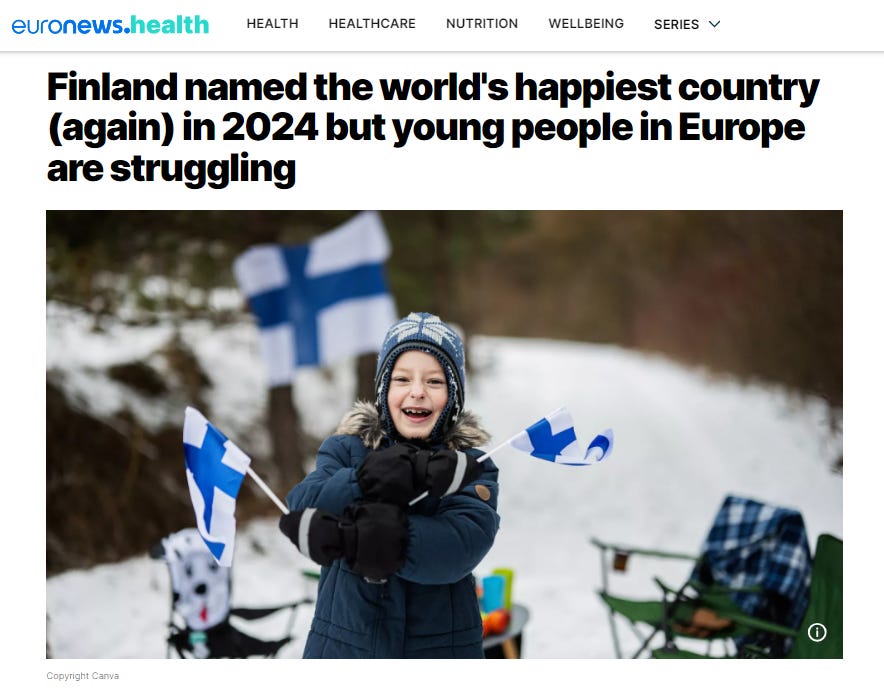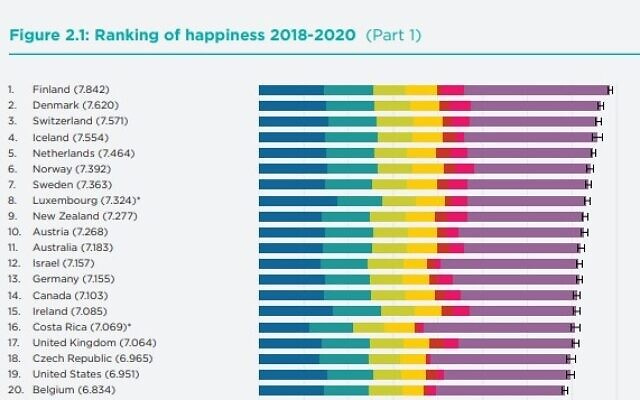Understanding the Decline in Global Happiness
Insights from the 2024 World Happiness Report
Between the endless stream of cat photos, the latest celebrity news, and the newest viral dance craze, a headline quietly made its rounds on social media this past month — one that might not have commanded the immediate attention of a sensational tweet but held a profound significance.
Finland, with its serene landscapes and robust social welfare system, has been announced as the happiest country in the world for the seventh consecutive time.
That was the main headline most news outlets ran with:
“The secret behind the world's happiest country” - The Economist
“I Know What Makes Finland the Happiest Country on Earth” - Outside Magazine
“Why Finland Is the World's Happiest Country” - U.S. News & World Report
“Want to Be Happy? Get to the Finnish Line” - a pun I just made up
And so it began, dozens of articles capturing a flurry of congratulatory notes and intrigued wonder about Finland's recipe for happiness.
However, buried beneath the celebratory confetti, a more sobering narrative unfolds—one that most discussions seemed to overlook, highlighting a concerning trend: the declining rates of happiness among young people.
That, to me, is the bigger story. The question shouldn’t be "Why is Finland so happy?" but rather, "Why aren't the rest of the countries as happy?" Or, perhaps more concerning, "Why is the younger generation across the globe experiencing a notable decline in happiness?"
(A second follow-up question for the young people: what does rizz mean?)
This year’s World Happiness Report focused on the happiness of people at different stages of life, revealing a nuanced picture of how age, societal changes, and regional differences intersect to shape our experience of happiness.
As you might have gathered from some of the bleak humor you see online, there’s been a decline in happiness among the youth in recent years, particularly in North America, where "happiness among the young has fallen sharply".
This trend contrasts with previous assumptions that happiness decreases with age. We normally think of the old curmudgeon yelling, “Get off my lawn,” when perhaps we should be thinking of the young whippersnapper saying, “Get off my Minecraft server.”
The report shows a clear distinction between those born before 1965 and after 1980. "At the global level, it reveals a lower level of happiness among people born since 1980".
Why the gap? I thought the world was supposed to be getting better. I mean we are currently in a time when there is less conflict and the lowest levels of poverty we’ve ever seen before. Not to mention you can binge watch Ted Lasso or Brooklyn 99 as much as you want.
So why the falling happiness?
Now, the primary role of the World Happiness Report is not to diagnose the specific causes of happiness or unhappiness but to collect data and provide insights into the patterns and trends of well-being across the globe.
Having said that, there are some themes in general happiness research, such as: the implications of social support, environmental concerns, access to healthcare, education pressures, and social media's impact on mental health.
Not to mention the generation of people who grew up in a post 9/11 world, were hit by a recession in 2008, have to contend with the explosion of social media, and, oh yeah, WENT THROUGH A GLOBAL PANDEMIC.
Okay, maybe the real question is how are people happy at all??
I’m kidding(?)
All of human history is marked by positives and negatives. Sure cavepeople had to run from tigers so they didn’t get eaten… but they also didn’t have to see their ex being uber successful all over social media.
The silver lining lies in our growing awareness. Reports like this give us a better picture of what’s happening. And armed with this deeper knowledge, we are better positioned to effect meaningful change.
It also reinforces why I’m so passionate about teaching people the skill of humor.
It's not just about making the daily grind more bearable; it's about fostering an environment where joy and well-being are at the forefront, influencing both productivity and satisfaction. It’s about making the fun things more fun and the hard things suck less.
This report underscores the need for such environments, as the global shifts in happiness impact our younger generations. By integrating humor and lightness into our serious discussions about mental health and happiness, we can create more inclusive, supportive, and ultimately happier communities and workplaces.
After which we can go back and look up what “rizz” means and how to have it.
PS. One way to add a bit more humor to someone’s life is to nominate them for a humor award. Submissions close Sunday, April 21st.
PPS. Liked this post? Click the heart icon ❤️ to let me know.
PPPS. Why are you happy right now?






I am happy because I am spending the weekend with my son going white water rafting!
I'm as pumped up as a rock concert crowd because my awesome niece is about to crash at my place for a whole week of fun, laughter, and unforgettable adventures! I am ready for a week filled with giggles, high-fives, and making memories that'll be talked about for years to come! Let the niece-ninja shenanigans begin!